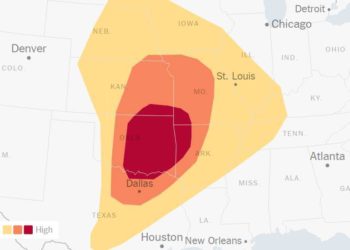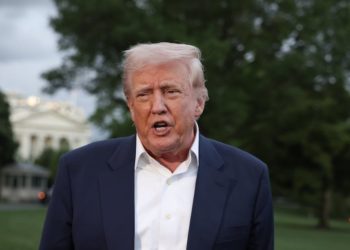Throughout most of his striking rise in the New York City mayoral race, Zohran Mamdani has attracted donors and young voters through a series of campaign-vérité videos, a breezy mixture of street wisdom and personality-driven, left-leaning messaging.
But on Friday, Mr. Mamdani found himself quickly preparing a far more sober video to defend himself against the false perception that he had refused to condemn the Holocaust.
His rapid response illustrated how a candidate’s stance on Israel and Jewish issues, especially during the divisive Israel-Gaza war, could carry outsize importance in the Democratic primary on June 24.
The primary comes at a precarious moment for the city’s Jewish community, the largest outside Israel. The Trump administration has cited concerns over antisemitism as a primary reason for cutting funding to elite universities and deporting and detaining students who have protested the war in Gaza.
Hate crimes against Jewish people are on the rise in New York City. In 2024, 52 percent of the reported hate crimes were against Jews, according to the police. The trend has continued in the first quarter of 2025, when 60 percent of hate crimes were committed against Jews.
The fallout is shaping the race for mayor. The UJA-Federation of New York, an influential Jewish service organization, is asking mayoral candidates on a survey if they will sign an executive order requiring all city agencies to “adopt and implement” the working definition of antisemitism from the International Holocaust Remembrance Alliance.
“Just like Black Lives Matter in that election season was the issue for the African American community, similarly, in this election cycle, antisemitism is the No. 1 issue for any Jew, regardless of your background,” said David G. Greenfield, chief executive of Met Council, a nonprofit that fights poverty. “I think that any politician who’s smart understands that.”
But for many politicians, including some Jewish ones, the issue is more nuanced. Brad Lander, the city comptroller running for mayor, is a reform Jew who considered becoming a rabbi. He is also an anti-occupation Netanyahu critic. Mr. Mamdani, who is Muslim, defends his use of the term “genocide” to describe Israel’s actions against Gaza. He also said in his video on Friday that his campaign had proposed spending more money to fight antisemitism than any other, and that as mayor he would “protect Jewish New Yorkers.”
Less nuance is seen in the stance adopted by the front-runner, former Gov. Andrew M. Cuomo, a staunch supporter of Israel who has sought to use antisemitism as a battering ram against his opponents and the left flank of the Democratic Party as he seeks a return to elected office.
Speaking at the West Side Institutional Synagogue last month, Mr. Cuomo launched a broadside against three of his opponents, including Mr. Lander, whom he described as “aiding and supporting the most aggressive anti-Israel policies.”
Mr. Lander responded the next day with an expletive Yiddish phrase. “I only curse in Yiddish when I’m really pissed off,” he said. He then appeared at the same synagogue that Mr. Cuomo attended to respond in more detail.
“Somehow, we Jews have become political pawns for politicians trying to score political points,” Mr. Lander said during his speech. “See something or someone you don’t like? Call it antisemitism, in a cheap, craven attempt to lure in Jewish support. All for political gain.”
Scott M. Stringer, the former comptroller and the other Jewish candidate in the race, also spoke at the synagogue. He reasserted his commitment to the Jewish community and said that he had been “appalled” by Mr. Cuomo’s “cynical, and frankly pitiful, attempts to divide the city and this community.”
In New York City, there are not many bonds stronger than those that tie its mayor to Israel and its supporters. Every mayor since Vincent R. Impellitteri in 1951 has visited Jerusalem, and nearly every major Democratic candidate this year, aside from Mr. Mamdani, has vowed to do the same if elected.
Voting math explains why. New Yorkers with distinctive Jewish last names represent 13 percent of the city’s 4.6 million active registered voters, according to Jerry Skurnik, a senior consultant for Engage Voters U.S., a political consultancy. Of those voters, 62 percent are Democrats and 16 percent Republicans.
They represented 26 percent of turnout in the 2021 Democratic mayoral primary, and the unified Orthodox support behind Eric Adams helped him win that year. This year, the battle for the Jewish vote is as pronounced as always, even if it may be more splintered given the growing divide over Israel’s continued offensive in Gaza.
“We knew that this would happen because of the war between Israel and Hamas and the devastation of Gaza and how much New Yorkers are paying attention to the return of the hostages,” said Phylisa Wisdom, executive director of the New York Jewish Agenda. “People are talking about this a lot in synagogues and Jewish coalitions around the city.”
In a recent Siena College poll, Jewish voters identified addressing discrimination as the fourth most important issue the next mayor should prioritize, behind affordable housing, supporting unpaid family caregivers and allowing New Yorkers to stay in their homes as they age.
In a recent Marist poll, Mr. Cuomo led with 26 percent of Jewish voters ranking him as their first choice. Mr. Lander was at 17 percent, followed by Mr. Mamdani at 14 percent and Adrienne Adams, the City Council speaker, at 10 percent. Another 16 percent of Jewish voters said they were undecided.
Mayor Adams, who was not included in the poll, plans to run as an independent in November and still has the Jewish vote keenly in mind. He is gathering signatures to run on a self-created “EndAntiSemitism” line. And last week, flanked by rabbis and other Jewish leaders at City Hall, he launched the Office to End Antisemitism to combat the rise in Jewish hate crimes.
Most prominent Jewish leaders have not said who they intend to back in the November general election. But the coffers of Fix the City, a super PAC aligned with Mr. Cuomo’s interests, have been filled by strong supporters of Israel such as Bill Ackman, the billionaire hedge fund manager and Trump supporter, and the investor Daniel Loeb. Each donated $250,000.
Mr. Cuomo still faces lingering resentment from some in the Hasidic community about restrictions and rules he imposed on houses of worship and mask wearing during the coronavirus pandemic. He has been urged to apologize, his advisers confirmed.
In private meetings with Hasidic sects and in interviews with Orthodox publications, Mr. Cuomo has suggested that he would have handled some pandemic decisions differently, such as consulting more with Jewish leaders around the implementation of red zones in Jewish neighborhoods where Covid was spiking and activities were restricted. Many heavily Orthodox areas were affected.
Mr. Cuomo has also, at times, promised more than he has delivered. Last year, he pledged to launch an advocacy group to fight what he called rising anti-Israel sentiment from the left wing of the Democratic Party, but the organization accomplished little toward its stated goal.
Mr. Cuomo declined to be interviewed for this article. His spokesman, Rich Azzopardi, pointed to the former governor’s consistent support of Israel, including an executive order banning state agencies from conducting business with companies that support the Boycott, Divestment and Sanctions movement, as well as his travel to the country.
“Anyone suggesting that antisemitism is not an issue in this city and state is in a state of denial,” Mr. Azzopardi said. “Andrew Cuomo’s bond with the Jewish community is strong, deep and unwavering.”
The attacks against Mr. Mamdani from some supporters of Israel have focused on his backing for the Boycott, Divestment and Sanctions movement and belief that anti-Zionism is not antisemitism.
More recently, he encountered criticism for accepting an endorsement from former Representative Jamaal Bowman, who lost his primary for re-election last year after pro-Israel groups poured millions of dollars into the race.
“My politics has always been driven by a commitment to the universal application of human rights, international law and the dignity and freedom of all people without exception,” Mr. Mamdani said in an interview.
Like Mr. Cuomo, Mr. Mamdani has increased his outreach to the Jewish community, attending at least seven public and private meetings with Jewish leaders and groups in the last month, including the legislative breakfast of the Council of Jewish Organizations of Flatbush.
Kalman Yeger, an state assemblyman and former councilman from Brooklyn who represents a large Orthodox population, took offense at Mr. Mamdani’s presence. During a speech at the breakfast, he said that some attendees had shaken hands with “one of the most vile antisemites” in public office.
The comments sparked a social media spat with one of Mr. Mamdani’s supporters, Chi Ossé, a Black councilman from Brooklyn, who called Mr. Yeger racist. Still, Mr. Yeger said that many of his constituents believed that antisemitism was an “existential crisis.”
In his video released on Friday, Mr. Mamdani stressed that he, too, abhorred antisemitism, and said that he had voted every year for a Holocaust Remembrance Day resolution that he was criticized for not co-sponsoring earlier this year. He separately said on Friday that he acknowledged Israel’s right to exist.
“This election,” Mr. Mamdani said in the video, “we’re seeing the real crisis of antisemitism and the pain of Jewish New Yorkers being weaponized as a political talking point.”
Jeffery C. Mays is a Times reporter covering politics with a focus on New York City Hall.
The post Israel and Antisemitism Loom Large as Issues in the N.Y.C. Mayor’s Race appeared first on New York Times.




